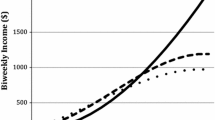Abstract
The college years are a time of significant growth in the individual's adaptive capacities in the cognitive, emotional, and social domains. Erikson 's theory of 1963 predicts that the college years are specifically a time of growth in the psychosocial issue of ego identity, but along with this development are increases in other aspects of psychosocial functioning. The opportunity to test this prediction across three cohorts of college students was presented through an expanded follow-up study of Constantinople's 1969 classic investigation of psychosocial development in a sample of over 300 undergraduates. Data were collected from undergraduates attending the same university in 1977 and 1988, allowing for a three-wave cross-sectional sequences design. The results indicated that, for all times of measurement and most of Erikson's psychosocial stages, college seniors generally had higher development than their younger classmates. Furthermore, females generally had higher psychosocial development scores than did males. The lack of cohort differences in the observed patterns of development and the minimal extent of cohort differences across college classes suggests that personality development during college is relatively uninfluenced by shifting psychosocial pressures over decades of social change.
Similar content being viewed by others
References
Baltes, P. B. (1968). Longitudinal and cross-sectional sequences in the study of age and generation effects.Human Develop. 11: 145–171.
Constantinople, A (1969). An Eriksonian measure of personality development in college students.Develop. Psychol. 1: 357–372.
Erikson, E. H. (1963).Childhood and Society (2nd ed.). W. W. Norton, New York.
Erikson, E. H. (1980).Identity and the Life Cycle. Norton, New York (original work published 1959).
Pascarella, E. G. and Terenzini, P. T. (1991).How College Affects Students: Findings and Insights from Twenty Years of Research. Jossey Bass, San Francisco.
Perry, W. G., Jr. (1970).Forms of Intellectual and Ethical Development in the College Years. Holt, Rinehart and Winston, New York.
Van Manen, K.-J. W., and Whitbourne, S. K. (submitted). Psychosocial development and life experiences in adulthood: A 22-year sequential study.
Walaskay, M., Whitbourne, S. K., and Nehrke, M. F. (1983–84). Construction and validation of an ego-integrity status interview.Int. J. Aging Human Develop. 18; 61–72.
Waterman, A. S. (1982). Identity development from adolescence to adulthood: An extension of theory and a review of research.Develop. Psychol. 18; 341–358.
Waterman, A. S. and Whitbourne, S. K. (1981). The inventory of psychosocial development.JSAS: Catalog of Selected Documents in Psychology 11; 5 (Ms. No. 2179).
Whitbourne, S. K., Jelsma, B. M. and Waterman, A. S. (1982). An Eriksonian measure of personality development in college students: A reexamination of Constantinople's data and a partial replication.Develop. Psychol. 18; 369–371.
Whitbourne, S. K. and Tesch. S. A. (1985). A comparison of identity and intimacy status in college students and alumini.Develop. Psychol. 21; 1039–1044.
Whitbourne, S. K. and Waterman, A. S. (1979). Psychosocial development during the college years: Age and cohort comparisons.Develop. Psychol. 15; 373–378.
Whitbourne, S. K., Zuschlag, M. K., Elliot, L. B., and Waterman, A. S. (1992). Psychosocial development in adulthood: A 22-year sequential study.J. Personal. Social Psychol. 63; 260–271.
Author information
Authors and Affiliations
Additional information
Received Ph.D. from the University of Massachusetts. Research interest is human factors.
Received Ph.D. from Columbia University. Research interest is psychosocial development in adulthood.
Rights and permissions
About this article
Cite this article
Zuschlag, M.K., Whitbourne, S.K. Psychosocial development in three generations of college students. J Youth Adolescence 23, 567–577 (1994). https://doi.org/10.1007/BF01537736
Received:
Accepted:
Issue Date:
DOI: https://doi.org/10.1007/BF01537736




